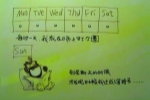
英语从句作文100字【一】
1.Theplace_______interestedmemostwastheChildren'sPalace.
A.WhichB.whereC.whatD.inwhich
2.Doyouknowtheman_______?
A.whomIspokeB.tow
hospokeC.IspoketoD.thatIspoke
3.Thisisthehotel_______lastmonth.
A.whichtheystayedB.atthattheystayed
C.wheretheystayedatD.wheretheystayed
4.Doyouknowtheyear______theChinesewasfounded?
A.whichB.thatC.whenD.onwhich
5.Thatistheday______I'llneverforget.
A.whichB.onwhichC.inwhichD.when
6.Thefactory______we'llvisitnextweekisnotfarfromhere.
A.whereB.towhichC.whichD.inwhich
7.Greatchangeshavetakenplacesincetheninthefactory_______weareworking.
A.whereB.thatC.whichD.there
8.Thisisoneofthebestfilms_______.
A.thathavebeenshownthisyearB.thathaveshown
C.thathasbeenshownthisyearD.thatyoutalked
9.Canyoulendmethebook______theotherday?
A.aboutwhichyoutalkedB.whichyoutalked
C.aboutthatyoutalkedD.thatyoutalked
10.Thepen______heiswritingismine.
A.withwhichB.inwhichC.onwhichD.bywhich
11.Theyarrivedatafarmhouse,infrontof______satasmallboy.
A.whomB.whoC.whichD.that
12.Itthereanyoneinyourclass______familyisinthecountry?
A.whoB.who'sC.whichD.whose
13.Iwanttousethesamedictionary______wasusedyesterday.
A.whichB.whoC.whatD.as
14.Icanneverforgettheday_______weworkedtogetherandtheday______wespenttogether.
A.when;whichB.which;whenC.what;thatD.onwhich;when
15.Thisisthereason______hedidn'tcometothemeeting.
A.inwhichB.withwhichC.thatD.forwhich
16.There’relotsofthings_____IneedtodobeforeIleave.
A.thatB.whoC.whyD.what
17.Doyouliketheredcar______wasmadeinTianjin?
A.whereB.whoC.whichD.when
18.--Doyouknoweverybody______cametotheparty?
--Almost,butIdon’tknowtheone______youtalkedwithnearthedoor.
A.who,/B.whose,thatC.that,whichD./,whom
19.Thisisall_____Iknowaboutthematter.
A.thatB.whatC.asD.whether
英语从句作文100字【二】
“现在分词短语”作后置定语
此项要明白三点:(1“现在分词短语”与前面的名词一定是主谓关系;(2它隐含的时态为与谓语动词同一阶段的时态。例如:谓语是一般现在时或将来时,现在分词所隐含的是现在时、现在正在继续时;如果谓语动词为一般过去时或将来时,现在分词所隐含的时态为过去时、过去正在进行时;(3being+-ed表示“正在进行时的被动语态”。如果信息的`中心在什么时候可以用现在分词呢?
(1当被修饰的名词为“不定代词”、“泛指意义的名词”或“专有名词”,可用现在分句短语作后置定语
由于主语是泛指,句子的意思往往表达的是一条“道理”或一件“事实”,所以它们的隐含时为“一般现在时”,此时就可以用分词短语作后置定语。为了看清分词所隐含的时态,配上定语。
为了读者看得明白,配上定语从句,把分词所替代的时间展示出来。
例1:Anyone touching that wire will get an electric stock.
任何人碰到那根电线就会触电。
= Anyone who touches that wire will get an electric stock.
例2:The only real and lasting solution is to convince people that driving is a skilled taskrequiring (=which requires constant care and concentration.
唯一一个有效、持久的方法是说法人们相信,开车是一种技术活,需要不断的小心,思想不能开小差。
例3:Charles and Sydney, looking (=who lookso much like each other, are often considered to be twins.
查尔斯和悉尼两个人的相貌非常相似,经常被人误解为双胞胎。
注:虽然被修饰的词是泛指意义的词,但是如果从句里的时态不是同步,则不可以用“现在分词”去作后置定语,只能用“定语从句”。
例句Do you know anybody who has lost a dog?
你知道有谁丢了一只猫?
(2 当被修饰的名词为特指,即有the限定,可用现在分句短语作后置定语
此类与上面一类一样,与被修饰词之间的关系为主动关系,所不同的是它强调该动词“正在进行”。
例1:Would you help me to pass this note to the person sitting in the corner?
能帮助我把这个条子递给坐在角落的那个人吗?
= Would you help me to pass this note to the person who is sitting in the corner?
注:同上一个“注”道理一样,本项虽然主句的主语是特指,但两个动作时态不是在同一阶段时间内发生,所以也不能用“现在分词”作定语,只能用“定语从句”。
例:The police are questioning the criminal who robbed the bank.
警察在审问那个抢劫银行的犯人。
(4“Being+过去分词”表示“正在进行时的被动语态”
“Being+过去分词”作后置定语等同于含有“正在进行时+被动语态”的定语从句。请注意与下面的“过去分词”作后置定语的区别,此项里的being是不可以省略的,否定表示现在时、完成时和过去时的被动关系了(详见2“过去分词”作后置定语。
例1:The dormitory being built is for girl students.
正在盖的宿舍是给女生住的。
例2:The baby being taken care of by my mother is mine.
正在由我妈妈带的这个婴儿是我的。
“过去分词短语”作后置定语
此项要明白三点:(1“过去分词短语”与前面的名词一定是动宾关系;(2主句为一般现在时或一般将来时,“过去分词”所隐含的时态是“一般现在时”或“现在完成时”。如果有时间/地点状语或有by引导的介词,还可以替代过去时,因为时间/地点状语以及by引导的状语都是强调的是动作。当谓语动词是“一般过去时或过去将来时”的时候,“过去分词”所隐含的时态是“一般过去时”或“过去完成时”。下面同样用分词与定语从句对比的方式要看看“过去分词”所替代的时态。
例1:The risk associated with a particular course of action may be lessened by use of a group rather than an individual decision-maker. 对于作出某项行动的决定,集体作的要比个人作的风险小。
= The risk which is associated with a particular course of action may be lessened by use of a group rather than an individual decision-maker. (由于主句为一般现在时,从句的时态与它同步,所以可以省略关系代词和助动词
例2:In fall 1992, people in Iowa sent truckloads of water to help Floridians hit(=which was hit by a hurricane.
在1992年的秋天,爱荷华州的居民将好几辆卡车的水送到受飓风袭击的佛罗里达州人的手里。
例3:I’d like to make some comments on the meeting held (=which was heldyesterday. 我想对昨天召开的会议发表一点看法。
英语从句作文100字【三】
This is my first week in ** Senior Middle School.Everything here is new for me.Our school is an old school but it`s very beautiful.I have 50 new classmates in my class.They`re all very excellent, I think, and I felt a little sad.Because I`m too common.But come to think of it,it`s a very good thing.I believe I can also be very excellent if I study with such excellent classmates.I didn`t know why Ms *** chose me to be the committee of study.But I know it`s a good chance for me to raise my ability.All I can do is do my best in the future.I am sure that Ms *** and my classmates can help me when I do something wrong. Because they`re all very kind.It`s a pleasure to work and study with them.I`m really very happy.I`m not an outstanding student in this class,but I can do the same thing like others.I believe I won`t make anyone disappointed.
英语从句作文100字【四】
当which引导的定语从句指代主句全部内容时,可以把which改为it,作形式主语,把原来的主句改成正在主语。或者把定语从句的整个信息改换为名词短语作主语,使原来的定语从句变成简单句。
例4: He indulges himself all day in computer games, which makes his parents extremely sad.
改为:It makes his parents extremely sad that he indulges himself all day in computer games.
他整天沉湎于电脑游戏,这使他父母伤心至极。(主语从句
或者:His indulgence in computer games all day makes his parents extremely sad. (名词短语











